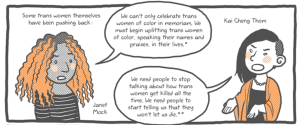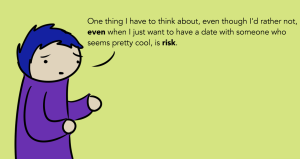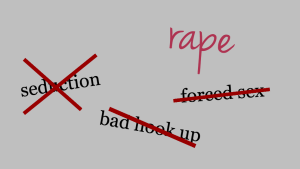
A person wearing a pink blazer sits at a desk, their hands covering their face.
“Thank you, sir,” my boss says to me every morning.
Each day, I’m tasked with putting together a morning brief filled with news clippings for him, and when I hand it over, this is always how he responds.
I’m not a sir. Though most gendered terms don’t really get to me, mister and sir send a shiver down my spine each time, but I bite my tongue.
I’m beyond grateful for this job. I know far too many people – particularly queer, trans, gender non-conforming, and non-binary folks of color – who are struggling to make ends meet in New York City without a steady paycheck.
I’m struggling to make ends meet with one, but when I looked at the multi-thousand dollar bill for my last hospital visit, I could let out a sigh of relief to see that it was paid by the insurance I have through my job. I’m one of the lucky ones who doesn’t have to worry about seeing my whole life come crashing down by virtue of a simple ailment.
But still I feel like I’m in a cage here. Every weekday morning, I force myself into the uniform I gave up on years ago: that of a professional man. I become “him” again. I tuck in my Blackness. The nail polish comes off, though I am always too tired to scrub off the stains.
Work is where we earn our livelihood, so the ways we might challenge the binary in other places might be more difficult to apply here.
Outside of work, I have been public and clear about my gender. I’m not femme, but I have no issue wearing whatever feels natural on me, and sometimes that’s skirts and lipstick. On the streets of New York, I’m able, mostly, to get around without too much violence in whatever I choose to wear.
When I go home to Cleveland, I realize just how privileged I am to be able to say that. Things are much different in a city like this. And even here, my build is a factor in my favor. I still brace myself for attacks, but do not shrink from them. I wish a nigga would.
If a friend calls me “sir,” they will hear about my discomfort. If I can’t be me inside of a space, I generally won’t enter. I’ve done enough bending to make myself fit into the world. I am learning just how malleable the world can be in order to fit me instead, and the world is much more beautiful when its pretzeled.
But most of my colleagues, and especially my superiors, are older and traditional, even if they believe they’re liberal-minded. Some things they just don’t understand.
When Caitlyn Jenner came out as transgender, someone in the office referred to her as “he, she, whatever,” and I said nothing. That’s what he must think of me, too. He wouldn’t know it, because he hasn’t really seen me, but I’m the “whatever” in his mind.
I wanted to show him, to let him know that he was talking about me and to defend myself. Instead, I simply walked away. It seems all the things I wish niggas would do on the streets happens at work, and I have no answer. I felt like a coward.
When does surviving contribute to the systems that force you to have to sacrifice yourself in order to survive?
To be Black, queer, and non-binary in this world is war, and sometimes passing feels like surrender. My suit jacket is a white flag. I will be “sir” for money. I will be silent for a fee. My soul is up for sale.
If it’s worth it to contort my body – to break my bones and back and still not fit properly inside of this suit – to still not know how I will pay next month’s rent despite my job, when does contortion cease being worthwhile? What is the difference between being smart and being weak?
Perhaps it’s in knowing I can survive “sir.” I can survive binary gendered bathrooms. Perhaps it’s in knowing this and not forgetting that there are others who can’t and don’t survive those things.
It’s in not submitting to the role of a captive, but to become an infiltrator instead.
“Don’t call me sir,” my colleague gently told me. I hadn’t even realized it had come out of my mouth. I’d become so used to hearing it that it slipped out naturally, like it wasn’t the bitter word it’s always been to me. The thought briefly crossed my mind: Is he queer?
The question slipped away just as quickly as it had manifest. It didn’t really matter. What mattered was that no one here asked to be called “sir.” I didn’t and neither did my colleague, yet we’d both been thrust up against those awful three letters against our will.
What mattered was that I had become part of the same cisheteronormativity that permeated the office which had also felt so carceral to me. I’d stopped pushing back against the cage and started building its bars.
I think surviving becomes something else entirely, something more insidious, when you start transferring the oppressive pressures you feel onto others. When you stop resisting and start sustaining. When you’re not a “sir” and you call others it anyway when they never asked to be addressed that way.
The limit to my contortion should have been demanding others to do the same. My colleague was proof I had pushed those limits, but I’m learning to pull the other way now.
I am learning to pull out the encouragement of personal presentation choices. I am pulling out the words to speak up against binary supremacy when the worst that can happen is a friendly disagreement. I am pulling out the celebration of Black names and hair and dress, which never fit gender properly anyway.
When I bring my boss the daily brief, I point out the articles that deal with gender issues, and we talk about it. He actually has interesting thoughts that can shift and evolve. I’m pulling out my own possibilities to shift and evolve, too.
And I’m pulling off the need for my gender to be seen a certain way, and instead embracing the need for me to see everyone’s gender in a way that liberates.
After all, the most important part of being non-binary is what you feel inside.
I know that I have friends outside of this place that will always see and love me for me. I know if there weren’t, I have the possibility of seeing and loving myself enough to account for the whole world.
I will not erase my gender at work even if I am holding it more tightly so that I don’t break. My gender is always my gender, seen or unseen.
Being non-binary is not just about a look. It’s not just about which pronouns you use. It’s not just about how other people see you. It’s about how you see yourself, and the only person who can determine that is you. It’s about how you see others, too.
When my boss calls me “sir,” it’s because he doesn’t see me like I see myself. When I called my colleague the same, I didn’t see him either.
Tomorrow, maybe I’ll feel safe enough to show my boss a little bit more of me, like my colleague showed me more of himself. Maybe I’ll even laugh with him about how much I hate the term. Maybe he’ll listen. Maybe he won’t. But no colleague will be forced to do the same again.
At the end of the day, knowing myself is enough. And the real me, a non-binary me, is someone who encourages others to know who they are, too.
Maybe one day we will run our own workplaces – our own battlefields in this war. It’s up to us to construct them on the side of liberation.
[do_widget id=’text-101′]
Hari Ziyad is a Contributing Writer for Everyday Feminism and a Brooklyn-based storyteller. They are the Editor in Chief of RaceBaitR, a space dedicated to imagining and working toward a world outside of the white supremacist cisheteropatriarchal capitalistic gaze, and their work has been featured on Gawker, The Guardian, Out, Ebony, Mic, Colorlines, Paste Magazine, Black Girl Dangerous, Young Colored and Angry, The Feminist Wire, and The Each Other Project. They are also an assistant editor for Vinyl Poetry & Prose. You can find them (mostly) ignoring racists on Twitter @RaceBaitR and Facebook.
Search our 3000+ articles!
Read our articles about:
Our online racial justice training
Used by hundreds of universities, non-profits, and businesses.
Click to learn more




















